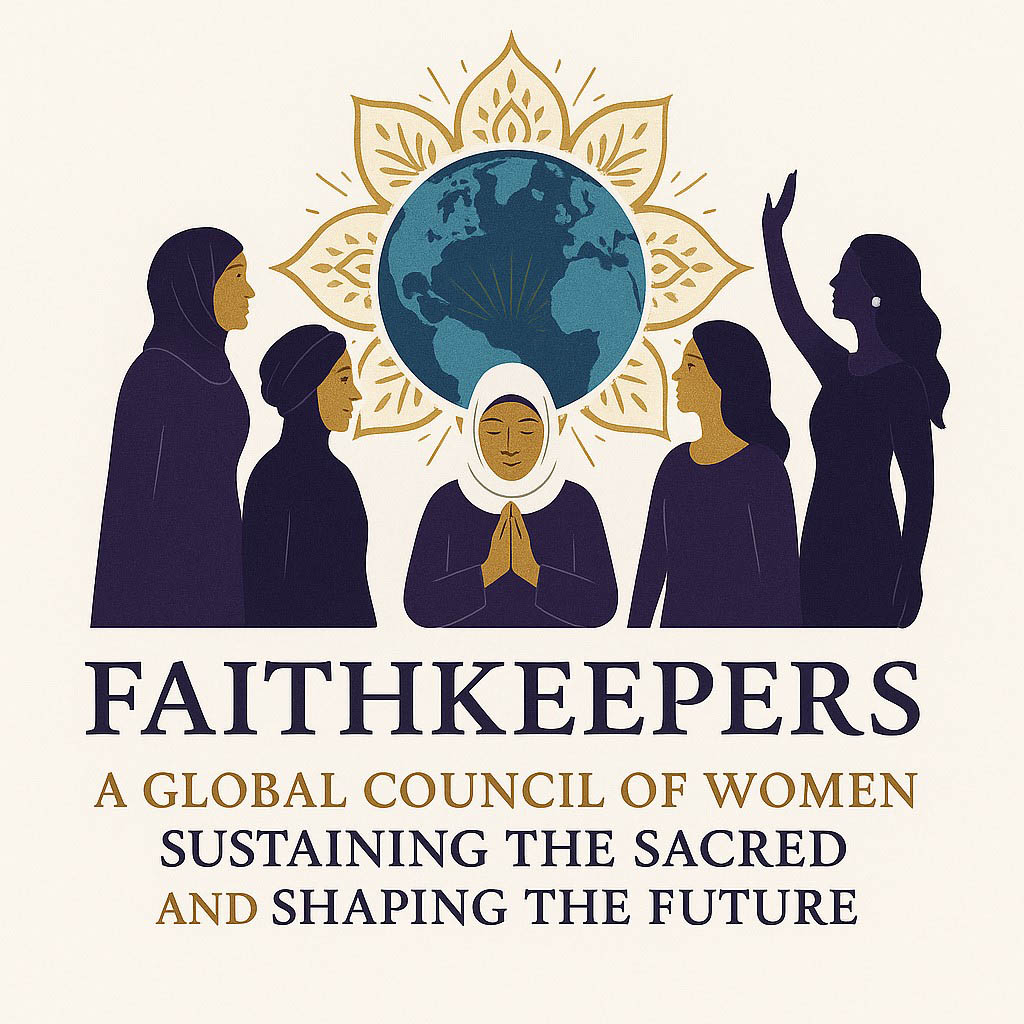Faithkeepers
Faithkeepers
A global initiative convening spiritually mature women of diverse faiths to preserve sacred traditions, lead interfaith justice efforts, and shape a shared spiritual and moral future through solidarity, wisdom, and transformative leadership.
Across every era and tradition, women can be found serving as keepers of the sacred—holding memory, midwifing transformation, sustaining communal identity, and shaping the moral and spiritual compass of future generations. In times of conflict and change, women of faith have often been the hidden architects of peacebuilding, educators of conscience, and sustainers of spiritual life. Yet, in global conversations about the future of religion, peacebuilding, and justice, women’s leadership is too often underrepresented or sidelined.

Faithkeepers: A Global Council of Women Sustaining the Sacred and Shaping the Future is a pressing call to action.
It is the foundational phase of a two-part initiative that will convene women leaders of diverse faiths to build a shared vision, solidarity, and an intergenerational strategy for spiritual renewal, justice advocacy, and the transmission of sacred traditions, thereby sustaining the sacred and shaping the future.
This Council is not simply an event
It is a movement of moral and spiritual significance that recognizes women as wisdom-bearers, architects, and conveners of sacred imagination. In this time of global uncertainty and transition—marked by social unrest, spiritual disaffection, and increasing polarization—the presence and prophetic voice of spiritually mature women are needed more than ever. The need for a collective, interfaith council of women leaders has never been more urgent. We are calling together women from all faith traditions who are:
- Formative guides for the next generation of women and girls in faith and justice work.
- Keepers of faith and sacred memory,
- Voices of spiritual leadership in their communities today
This Council—Faithkeepers:
A Global Council of Women Sustaining the Sacred and Shaping the Future—will provide an opportunity for high-level women leaders of faith from diverse traditions and continents to come together for discernment, theological reflection, strategy, and solidarity-building.
- Conduct virtual planning sessions over 12–18 months in six major languages: English, Spanish, Arabic, French, Hindi, and Mandarin;
- Articulate a shared theological and ethical framework for interfaith women’s leadership and
- Establish governance, vision documents, and communication infrastructure for the Council.
Objectives of the Council
- To identify and convene 50-75 spiritually mature women leaders of diverse faiths across major world religions over a period of 12-18 months, beginning in January 2026.
- To articulate a shared theological approach and ethical framework for interfaith women’s leadership.
- To establish governance, vision documents, and communication infrastructure for the Council.
- To build interfaith solidarity and collaborative capacity for peacebuilding, justice advocacy, and the preservation of spiritual heritage.
We believe now is the kairos moment—a spiritually pregnant time—for women to step forward not simply as helpers or responders but as wisdom-bearers, architects, and conveners of sacred imagination. As Evelyn Underhill once wrote, “Spiritual leadership is not a matter of technique but of presence.” The women who will gather for this Council carry that presence—and the time has come to gather them.
Spiritual Scriptures and Sayings in Support of the Concept
Christianity
- Proverbs 31:26 (NIV): “She speaks with wisdom, and faithful instruction is on her tongue.”
This verse speaks to the wisdom and guidance women offer, echoing their role as spiritual leaders who pass down teachings and guidance to future generations. - Galatians 3:28 (NIV): “There is neither Jew nor Gentile, neither slave nor free, nor is there male and female, for you are all one in Christ Jesus.”
This emphasizes the equality of women in the faith, highlighting their rightful place at the table of spiritual leadership and influence.
Islam
- Surah At-Tawbah 9:71 (Qur’an): “The believing men and believing women are allies of one another. They enjoin what is right and forbid what is wrong. They establish prayer and give zakah and obey Allah and His Messenger.”
This verse underscores the partnership between men and women in building a righteous society, reinforcing women’s active role in faith, justice, and leadership. - Hadith of the Prophet Muhammad (PBUH):
“Paradise lies at the feet of mothers.”
It serves as a powerful reminder of the reverence and importance placed on women, particularly mothers, in Islamic tradition, as they are regarded as key carriers of faith, wisdom, and spiritual continuity.
Judaism
- Proverbs 31:30 (Jewish Tanakh): “Charm is deceptive, and beauty is fleeting, but a woman who fears the LORD is to be praised.”
This celebrates the spiritual power and respect that women who embody faith command in Jewish tradition, aligning with their role as preservers and guides of sacred memory. - Genesis 2:18 (Tanakh): “It is not good for the man to be alone. I will make a helper suitable for him.”
This foundational scripture speaks to the partnership and support of women in the spiritual and moral spheres, which has been key in shaping the future generations of faith.
Hinduism
- Bhagavad Gita 9.32: “O son of Kunti, those who take refuge in Me, though they be of sinful birth, women, vaishyas, and sudras as well, can attain the supreme goal.”
In this verse, the Gita speaks of the equality of all, including women, in attaining spiritual liberation. It affirms the inclusivity and leadership potential of women in spiritual matters. - Rigveda 10.85.44: “May we, O women, be endowed with the power to uplift the world.”
This speaks to the inherent spiritual strength and leadership qualities attributed to women in Hinduism, reflecting their role in shaping and guiding spiritual and moral direction.
Buddhism
- The Buddha: “Just as a mother would protect her only child with her life, even so, let one cultivate a boundless love towards all beings.”
This teaching emphasizes compassion, which women often embody as they lead with care, love, and empathy in both faith and activism. - Dhammapada 223: “Better than a thousand hollow words is one word that brings peace.”
This verse serves as a poignant reminder of the powerful, transformative influence of words and wisdom, which is central to women’s roles as leaders in faith and peacebuilding.
Indigenous Wisdom
- Native American Proverb: “We are the ones we have been waiting for.”
This powerful saying affirms the responsibility and agency of women as leaders and guardians of spiritual traditions and future generations.
Catholicism
- Luke 1:45 (New American Bible): “Blessed are you who believed that what was spoken to you by the Lord would be fulfilled.”
This verse speaks to the profound faith and trust demonstrated by Mary, the mother of Jesus. Her role as the “first disciple” highlights the importance of women in the Catholic tradition as spiritual leaders, exemplifying faith, obedience, and courage. - Pope Francis (2015, Apostolic Exhortation Amoris Laetitia):
“Women are at the heart of the family and society, and they have an important role to play in the Church. Their contribution is indispensable.”
This quote from Pope Francis affirms the central role women play in the life of the Church and society, not just as supporters but as essential leaders who nurture faith, guide communities, and shape the moral and spiritual future of humanity.

Select References
- McLoughlin, W. G. (1978). Modern Revivalism: Charles Grandison Finney to Billy Graham. Wipf and Stock Publishers.
- UN Women (2021). Women of faith mobilize against COVID-19 and for equality. Link
- Underhill, Evelyn. (1926). The Spiritual Life.
- Chittister, Joan. (2002). Called to Question: A Spiritual Memoir.
- Wadud, Amina. (1999). Qur’an and Woman: Rereading the Sacred Text from a Woman’s Perspective. Oxford University Press.
- Christenson, Evelyn. (1970). What Happens When Women Pray. Victor Books.
- Griffith, R. Marie. (2000). God’s Daughters: Evangelical Women and the Power of Submission. University of California Press
